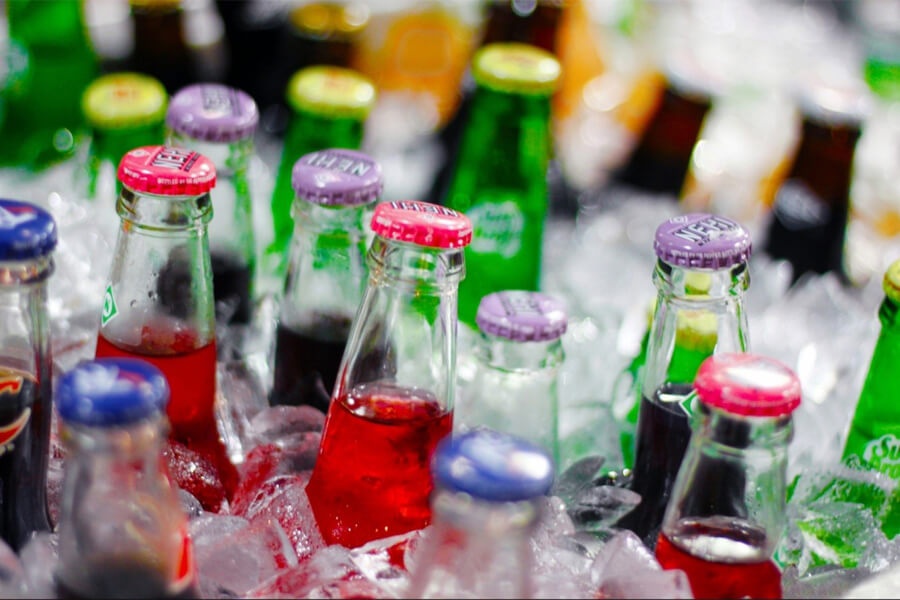Soft drinks sales hit 4.6 billion litres in 2023
 |
The report released on July 18 reveals that ready-to-drink tea, bottled water, and carbonated drinks are the top three segments in Vietnam's soft drink market.
In 2023, Vietnam sold 1.594 billion litres of ready-to-drink tea, accounting for 34.2 per cent of the country's total soft drink sales. Bottled water is the fastest-growing category, with a compound annual growth rate of 9.9 per cent, reaching 940 million litres in sales in 2023. The growth rate of carbonated drinks was moderate, with annual sales reaching 824 million litres in 2023.
The recent trends in Vietnam's soft drink industry are influenced by multiple factors. In 2023, Vietnam's GDP growth was 5.05 per cent, below the initial target of 6.5 per cent. To support businesses and consumers, the Vietnamese government reduced the VAT rate from 10 per cent to 8 per cent from July 2023 to the end of the year, aiding the development of the fast-moving consumer goods sector, including soft drinks.
Besides government policy support, the increase in outdoor activities and travel by Vietnamese residents post-pandemic has also benefited the sales of soft drinks. With more time spent on work, study, and leisure activities outside, the demand for various products, including soft drinks, has increased.
Among the major players in Vietnam's soft drink industry, Suntory PepsiCo Vietnam Beverage Co leads in the categories of carbonated drinks, juice, bottled water, and sports drinks, making it the largest soft drink company in Vietnam in terms of non-trade sales volume.
Coca-Cola Beverages Vietnam Co. is also a major producer of carbonated drinks, bottled water, and juice. Tan Hiep Phat Group is a leading local company, ranking second overall, with its tea beverage brand aligning well with health and wellness trends, although it faces competition from other players in the same segment, such as URC Vietnam Co. Ltd.
Sustainability is also a development trend in the industry, with more Vietnamese soft drink brands committing to using 100 per cent recycled materials in their packaging. This drives the development of a circular economy in Vietnam, turning waste into resources rather than releasing it into the environment.
Manufacturers are also working to encourage consumers to recycle bottles by displaying messages like 'Recycle Me' on packaging to raise awareness and motivate people to take action.
The performance of the soft drink industry will remain stable during the forecast period of 2024-2033, with major market players continuously stimulating demand through new product development, active marketing campaigns, and special events.
Bottled water and juice to be the most dynamic categories in Vietnam's soft drink industry in the coming years, benefiting from their healthier image. In contrast, the growth rate of carbonated drinks is expected to slow due to their increasingly unhealthy image and concerns about their high sugar content.
According to Research and Markets, sales in Vietnam's soft drink industry is forecast to reach 7.453 billion litres by 2033, with a compound annual growth rate of 4.8 per cent from 2024 to 2033. Different types of soft drinks are expected to have varying growth rates.
Beverage brand companies, beverage producers, and beverage distributors are set to find potential investment opportunities in Vietnam's soft drink market. Packaging producers and other related companies in the beverage industry will also find many opportunities in the Vietnamese market.
 | Gains outweigh losses with sugar-sweetened beverage tax Taxing sugar-sweetened beverages is attracting great attention in Vietnam, with different ideas about the pros and cons. Dr. Angela Pratt, World Health Organization representative in Vietnam, talked to VIR’s Bich Thuy about lessons that can be taken from other countries. |
 | Valuable lessons can direct sugary beverage rules Tax policy is an effective financial measure to control consumption of sugar-sweetened beverages (SSBs). The significant prevalence of obesity and diet-related non-communicable diseases (NCDs) driven by increasingly unhealthy dietary patterns is of global health concern. Significant attention has been given to curbing excess sugar intake and particularly SSB consumption. |
 | Tax increases must be effective to support beverage groups The beverage manufacturing and trading sector has been making an important contribution to Vietnam’s socioeconomic development and meeting domestic and export consumption needs, ensuring market stability. |
What the stars mean:
★ Poor ★ ★ Promising ★★★ Good ★★★★ Very good ★★★★★ Exceptional
Related Contents
Latest News
More News
- Ho Chi Minh City launches plan for innovation and digital transformation (February 25, 2026 | 09:00)
- Vietnam sets ambitious dairy growth targets (February 24, 2026 | 18:00)
- Masan Consumer names new deputy CEO to drive foods and beverages growth (February 23, 2026 | 20:52)
- Myriad risks ahead, but ones Vietnam can confront (February 20, 2026 | 15:02)
- Vietnam making the leap into AI and semiconductors (February 20, 2026 | 09:37)
- Funding must be activated for semiconductor success (February 20, 2026 | 09:20)
- Resilience as new benchmark for smarter infrastructure (February 19, 2026 | 20:35)
- A golden time to shine within ASEAN (February 19, 2026 | 20:22)
- Vietnam’s pivotal year for advancing sustainability (February 19, 2026 | 08:44)
- Strengthening the core role of industry and trade (February 19, 2026 | 08:35)

 Tag:
Tag:




















 Mobile Version
Mobile Version